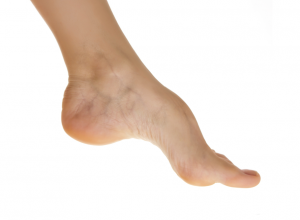

CHARCOT-MARIE-TOOTH DISEASE
Charcot -Marie-Tooth disease is a group of inherited disorders that cause nerve damage. This damage is mostly in the arms and legs (peripheral nerves). It is also called hereditary motor and sensory neuropathy. It generally leads to smaller, weaker muscles, loss of sensation and muscle contractions, and difficulty walking. Foot deformities such as hammertoes and high arches also are common. Symptoms usually begin in the feet and legs, but they may eventually affect your hands and arms.
SYMPTOMS
Signs and symptoms of Charcot-Marie-Tooth disease may include:
CAUSES - It is usually an autosomal dominant disorders but can be recessive or X-linked. Type I results from a duplication (extra copy) of the peripheral myelin protein-22 gene (PMP22), located on the short arm of chromosome 17; it accounts for 70 to 80% of CMT1 cases. Sometimes, these mutations damage the nerves. Other mutations damage the protective coating that surrounds the nerve (myelin sheath). Both cause weaker messages to travel between your limbs and brain.
COMPLICATIONS - Charcot-Marie-Tooth disease vary in severity from person to person. Foot abnormalities and difficulty walking are usually the most serious problems. Muscles may get weaker,and you may injure areas of the body that experience decreased sensation.
HOMOEOPATHIC MANAGEMENT:
Aconite - After a fright the child remains unnaturally timid; or from unusual fatigue, or from exposure to a very dry cold atmosphere; much trembling of extremities.
Agaricus - TRUE CEREBRAL CHOREA, with clonic spasms when awake, quiet when asleep, though jerking when going to sleep; spasmodic motions, from simple involuntary motions and jerks of single muscles to a dancing of the whole body, or ATTACK CROSSWISE (Stramonium), AN UPPER RIGHT AND A LOWER LEFT EXTREMITY, OR VICE VERSA; convulsive condition of the muscles of head and neck, constantly; extreme mobility of lower limbs and the body generally. Frequent nictitation of eyelids; twitching's and spasms of eyeballs; redness of inner canthi of eyes; lachrymation; sensitiveness of lumbar vertebrae, spinal column sensitive to pressure or to a hot sponge; body convulsed, as if a galvanic battery were applied to the spine. Ravenous appetite, but difficulty of swallowing; cervical glands swollen; inarticulate speech; itching of eyelids and of different spots on skin, resembling chilblains; weakness and coldness of limbs; unsteady walk; joints feel as if dislocated; emaciation; IDIOTIC EXPRESSION OF FACE; (<) during approach of a thunderstorm, while awake; (>) while asleep, perfect freedom from all involuntary motion.
Arsenicum - Stubborn cases of chorea; uneasiness in legs, changes position of this feet constantly, or walks about to get relief; trembling of limbs and great prostration, with anxious restlessness.
Artemisia-vulgaris - Peevish and inclined to weep; speech unintelligible, can utter but single words and these only with great exertion; froth at the mouth; hunger, but cannot get the food down, swallowing difficult; cannot sit without support or else would be thrown from the chair; to muscular motion at night; after fright or other emotions.
Asafoetida - Very sensitive and excitable; all perception of the senses lessened, but not consciousness; grinding of teeth; starting at night; transient griping pains in umbilical region; abdominal pulsations; with twitching of single muscles or convulsive motions of the same; speech unintelligible; tongue white, swollen; constantly chewing and working frothy slime out of the mouth; great disgust for all food; flatus upward and hiccough; constant convulsive TREMOR OF LIMBS, RELIEVED BY THE HANDS OF ANOTHER PERSON; constant change of mind, restlessness, easily confused.
Asterias-rubens - Trembling jactitation of both arms and legs; unable to feed herself or to walk; frequent, clear, profuse urine; capricious appetite for highly-seasoned dishes and aversion to meat; itching spots on skin; sensation as if the brain were shaken by electric shocks; from fright or mental depression.
Belladonna - Motions of body are generally backward or to and fro; constantly changing emprosthotonos to opisthotonos; boring head into pillow; numbness of fingers; grinding of teeth; moaning; soreness and tenderness of last lumbar vertebrae; flushed face and sore throat. After fright or mental excitement, especially when the flexors are affected and the paroxysms are preceded by numb feeling in muscles, or by a sensation as if a mouse ran over the extremities; dull, heavy, drowsy, stupid; tongue paretic; difficult articulation; violent congestion; throbbing of carotids, dilated pupils, wild look, injected eyes. REFLEX CHOREA FROM DENTITION OR PREGNANCY; EPIDEMIC CHOREA.
Bufo - Stuttering and stammering; gets angry when incoherent speech is not understood; rapidly increasing twitching of all muscles o the body, till all of them are violently, agitated.
Physostigma - Chorea of right side; tongue swollen and palsied.
Calcarea-carb - Fright followed by trembling motions of upper and lower limbs; dancing wavelets of light; itching of eyes; patient low-spirited and peevish, (>) from engaging his attention; cannot speak, as he bites his tongue when trying to speak (Conium) twitching of muscles, sometimes only one-sided, trembling of body, falling down, great weariness; feet cold and damp; profuse perspiration on head. During SECOND DENTITION, FROM ONANISM, WORMS, FROM SCROFULOSIS.
Caulophyllum - Chorea in young girls with menstrual troubles.
Causticum - Scrofulosis. Convulsive movements, especially ON RIGHT SIDE, turns head to the right, with distortion of eyes; tendency to aphonia and other paralytic conditions; dimness of vision; muscles of tongue affected so that speech is thick and words are jerked out; palsy of face; weakness of mind; CHOREA AT NIGHT, distortion, twisting and jerking of limbs preventing sleep; constipation; after suppressed eruption of head; (<) in open air, evenings.